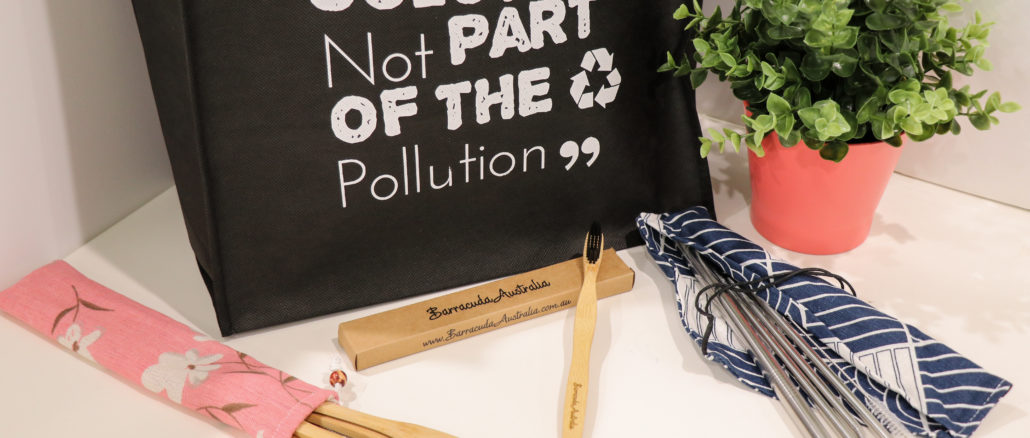
Are you up for an important challenge? When you next go to shop, see how you can personally reduce the amount of plastic you will take home. Just try it. Being conscious about plastic is the first step towards your contribution to reducing its prevalence. Because on average, a plastic bag has a usefulness of approximately 12 minutes, and it takes a lifetime to break down.
Our impact on the planet is really on show, particularly with the media showing us images of the amount of plastic floating in our oceans. The Ocean Clean Up initiative estimates that 1.15 to 2.41 million tonnes of plastic are entering the ocean each year from rivers. We’ve reached a critical point in our history where each of us need to contribute to the slow down of the pollution of our environment. We have one earth and we are clogging it with our waste quicker than we can deal with the consequences of our consumerism.
Zero waste is not something you can do overnight. But simply being conscious of what you buy and how you recycle and reuse does contribute to halting the rate of waste being put into our environment.
Think about the products you are buying, not only about what they are made from but also how they are packaged. Make sure the corporates know that you want to purchase from companies who are diligent about their impact on the planet – from how they present their goods to how their goods are manufactured; where and how the workers are treated and compensated for their labour.
Some simple things you can do as part of your daily routine include:
- Consider if you really need it before you buy it. Do you need a new phone every year or could you save yourself some coin and the environment by using it until it completely dies?
- Can you upcycle, swap or share items with others within your community? Think about starting a co-op or host events where clothing or goods can be exchanged between friends.
- When you’re out, say no to plastic straws whether it be at the bar, the takeaway place or smoothie joint. Go for paper, metal or bamboo straws as an alternative or just go without one.
- It goes without saying that bringing your water bottle or reusable coffee cup can make a daily improvement on the amount of plastic in our waste chain. It ends up being better for your hip pocket as well.
- Avoid buying things in plastic where possible. Do you really need a plastic bag for those three apples and another one for the tomatoes? The answer is probably no. If you do need a bag, invest in some of the reusable ones made from recycled plastic bottles which don’t affect the weight of your produce on the scales.
- Look at replacing plastic sponges and bath netted sponges with cloth alternatives. Try bamboo cloths which provide texture for cleaning. You may not know, but microfibre cloths contribute heavily to plastic pollution with over 1.4 million trillion microfibres said to be in our oceans already. Go back to using the traditional wash cloth or face cloth in the bathroom or a natural product like a loofah.
- Replace paper towels with a traditional cloths instead and simply rinse and reuse. Then wash when needed and hang on the line to dry. Reuse your old clothes as your cleaning rags.
- Move towards a bamboo toothbrush instead of a plastic one. Toothbrushes are a huge polluter of our oceans. When we purchase toothbrushes, our focus is on our teeth and unfortunately not on our oceans. Try using a 100% bamboo toothbrush (check the bristles are bamboo and not nylon) as these are fully bio-degradable.
- Always look at what you can use again – glass containers to store dry goods, a linen bag to store your bread and biscuit tins to store things like crackers, noodles and nuts.
- Remember the days where there were handkerchiefs instead of tissues. Our grandparents survived and so can we.
- Have a go at making your own cleaning products (plenty of recipes can be found on the interwebs) or simply watch what you use instead of buying something new for every chore.
- Officeworks provides an E-waste (computers, laptops, phones) recycling service as well as collection points for recycling items they stock, such as printer cartridges. Consider this next time you’re discarding your office supplies.
- And finally, if you see rubbish or litter, simply pick it up. Dispose of it properly instead of letting it go into our waterways and our oceans. Every action counts and mother earth will thank you for it.
Want to educate yourself further? Think about setting up a Pinterest board where you can collect ideas for shifting your habits and routines to lower your impact on the planet. Remember small things can make a big difference, so let’s all get moving with our contribution.
Writer, thinker, creator – Libby is interested in the things that make the world turn. She loves to explore modern life, its ironies, complexities and culture. She is currently writing her first book while also juggling a business, her art and her family.


Leave a Reply